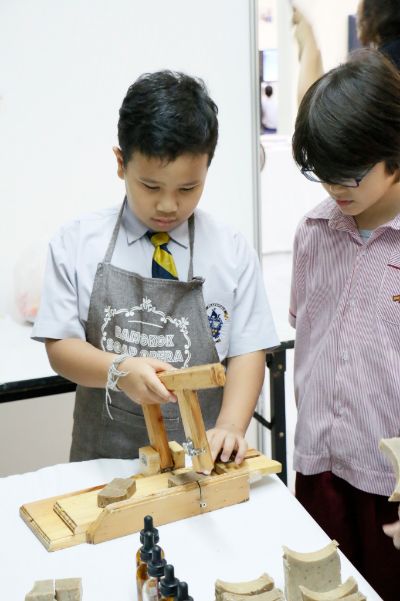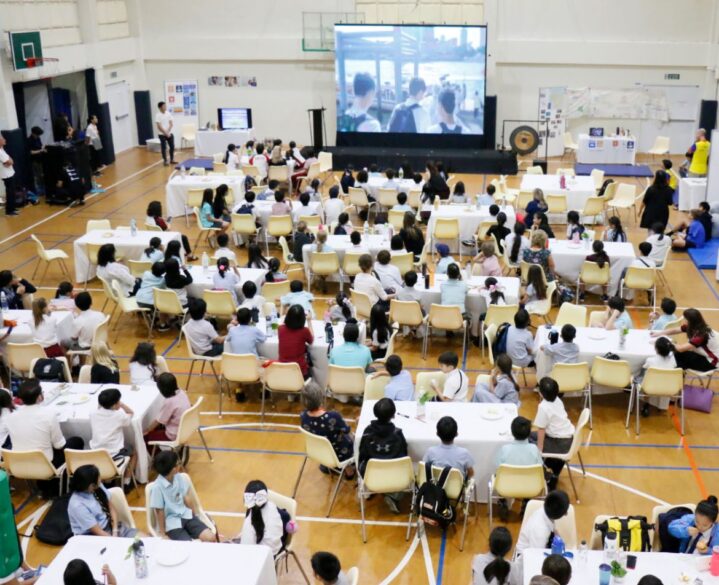
Inspiring Child Led Change
Bangkok’s international schools, grassroots sustainability groups and green businesses unite to inspire child led change. Term started with a special event for children at Bangkok’s international schools when 120, 7 to 11 year olds attended the city’s first ‘EcoBEASTs Community Action Day.’ This educational event put children and teachers in touch with social enterprises, ethical businesses and NGOs. The aim was to learn about and inspire actions on the environmental and sustainability problems we face today.
The beast in EcoBEASTs stands for Bangkok Education for Action on Sustainability Team, a passionate group of teachers hoping to create links between international schools and Thailand’s wider environmental community. The accompanying website will allow schools and local organisations to connect and work together on sustainability. Spearheading the ‘EcoBEASTS’ are Helen Mullan and Katy Waring, primary school teachers at St Andrews International School (Sukhumvit 71 campus) and Shrewsbury City School respectively. The online element has been developed by Glyn Hupalo from Amnuay Silpa School.‘We believe that educating the children of today will help solve the problems of tomorrow,’ said Mullan, ‘and hope to highlight honestly what’s happening to our planet and introduce children to those trying to tackle these problems.’
Teachers to act
‘The natural world is in crisis and we’ve got growing inequalities. But there’s a huge grassroots movement trying to bring about change. By developing awareness of both problems and solutions we hope to spark discussion at home. Our students have the support and contacts to drive forward positive change,’ explained Waring. ‘Educators must address sustainability as it’s now a significant part of the culture our students are growing up in, and children are increasingly interested in it,’ enthused Paul Schofield, headteacher of St Andrews International School on Sukhumvit 71, which hosted the event. ‘If schools don’t get this right, where will we be in 15 or 20 years’ time?’ he asked.
Getting it right
One approach is to put young people themselves in charge, and student led NGO ‘Grin Green International’ is an example of this. ‘Students are responsible for all the work in our organisation and all achievements are credited to them,’ explained 18 year old director Donggeon Yun. The group focuses on single use plastic. ‘We are promoting cultural change in Thailand. We believe that in order to ban single use plastics we must change the mindset of the people, and we do this through events and campaigns,’ added Thiti Usanakul, 17, a keynote speaker at the event, who will take over as director when Yun graduates.
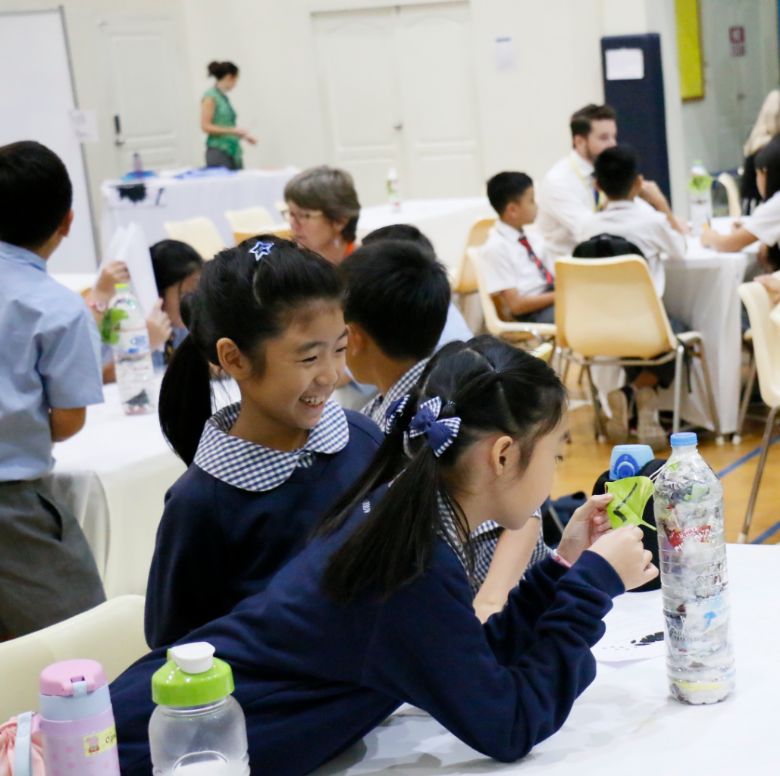
Plastic bag monster:
In 2018, Grin Green International created their own plastic bag monster. ‘It’s a full suit made of 700 plastic bags, equivalent to the number of plastic bags a Bangkokian uses in three months. Along with signs, posters and a petition to present to government, we toured around Bangkok for 13 hours,’ recounted Yun. The resulting video had 29,000 views over social networks in a single day. Geoff Baker, social studies teacher and founder of ‘Grin Green International’ wore the costume originally: ‘as teachers we should set an example, I wanted to show the students not to be afraid of doing something embarrassing, and they have worn it themselves at all events since,’ the teacher said. Baker sees the educational aspect of ‘Grin Green International’ as running deeper than environmentalism, citing the fact that his students can confidently conduct a press interview unsupported by him as an example: ‘I feel they should be gaining experience of the real world and aim to instil a professional mindset. Acting on single-use plastic is a way to do this.’
Just 11 years old
But it’s not just the older students at work here: 11 year old Lilly Smittipatana, also a keynote speaker, has been campaigning against single-use plastic since she was eight after being shocked by a visit to a litter strewn Thai beach. Smittipatana met with many retail business leaders and explained her concerns about plastic bags. As a result, she won agreement from a whole host of them to go ‘plastic bag free’ on certain days of the month. She is now supported by a band of equally concerned school friends.
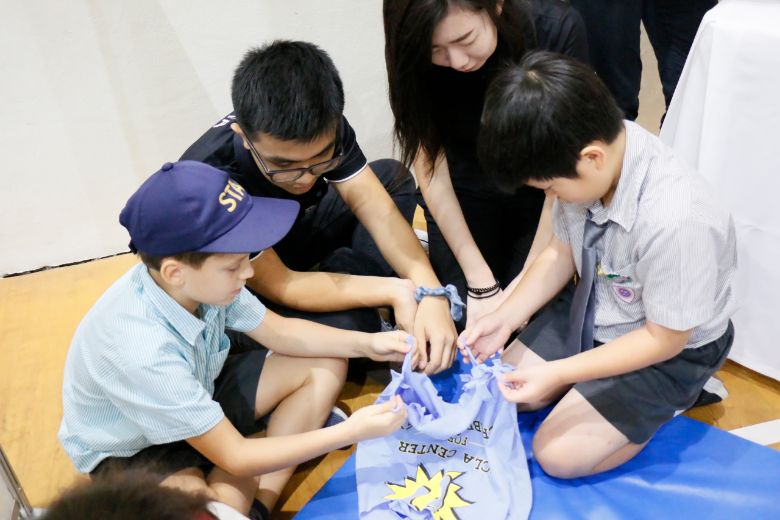
Hands-on learning
A key part of the community day was giving youngsters the chance to take part in workshops provided by 15 environmental organisations, covering areas such as air pollution, wildlife and soil conservation, and making soap from recycled cooking oil. One example, ‘Precious Plastic Bangkok,’ showcased a fully functioning plastic recycling machine. ‘We are a communitybased plastic recycling solution. Our machines, designed in the Netherlands, are simple to construct, so any community can build them and tackle the plastic pollution that’s affecting them,’ explained Dominic Chakrabongse who ran the workshop. The children saw the machine shred, melt and eventually turn a pile of plastic bottle caps into a brand-new bowl. ‘I want to inspire children to see plastic in a different light. It can be collected and turned into something useful – depending on the mould used. I hope to see our machine in school design and technology workshops, allowing students to use their imaginations to create their own moulds,’ Chakrabongse said. The youngsters suggested making toy turtles and whales to illustrate the problem of plastics in our oceans.
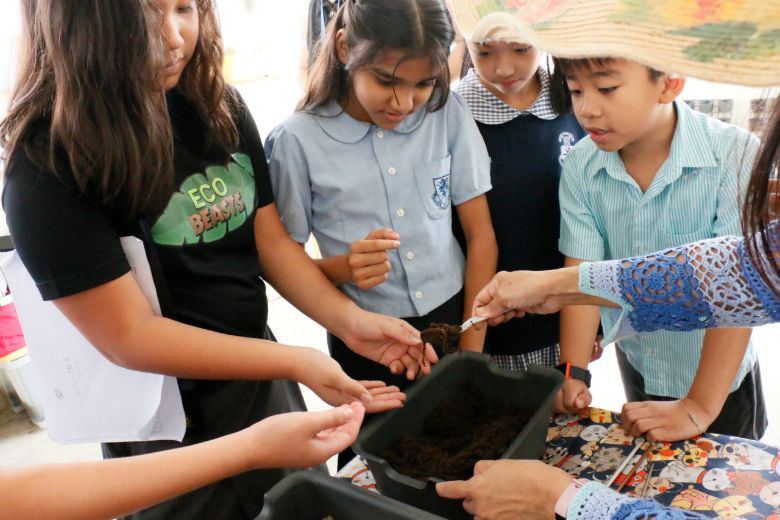
Connecting with business
Socially conscious businesses also ran workshops. Luke James runs a company called ‘Bambew,’ which manufactures bamboo straws creating employment in an economically disadvantaged rural part of Vietnam. The straws are then exported around the world. James’ workshop focused on the length of time single-use plastic products will remain on our earth, and tips for how to curb personal use of plastic. Each child received their own, specially branded EcoBEASTs bamboo straw.
Parental support
Interested parents also attended: Yuka Hart, mother of two daughters aged 7 and 11 was enthusiastic about the importance of the event: ‘many children around the world already know the world is suffering. We shouldn’t ignore their small voices. They should learn and take actions for their own future,’ she said. ‘Parents are hugely interested in this area. It was parents who first pushed us to implement a school wide recycling system at St. Andrews,’ recalled headteacher Schofield, ‘we’re putting the money raised from selling the materials collected aside to create a fund to support our maids and gardeners with school fees and medical bills,’ he added.
Plans for the future
After the workshops the pupils were asked to write action plans to take back to their schools. The room buzzed with ideas. St Andrews’ pupils Mneme, Shana, Sophie and Rio were inspired by a workshop about turning old clothes into shopping bags. Their company, called ‘Eco-struction,’ would ‘build stuff out of what other people think is waste. We will use donated clothes to create eco-bags,’ the girls said. ‘We will sell them and use the money to buy a ‘Precious Plastic’ machine to make bowls out of bottle caps. We can sell these too’ they went on. ‘The eco-bags will also help reduce the use of plastic bags at the same time,’ Mneme added. The girls’ scheme shows a clear understanding of what the day was about. It is now the work of the teachers and adults in their lives to guide them towards making their ambitious plans a reality. Ultimately, creating real change makers for the future
